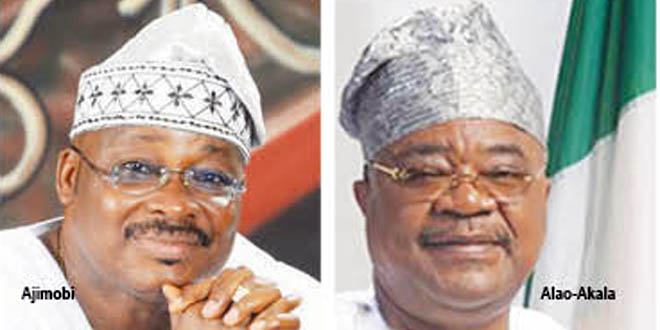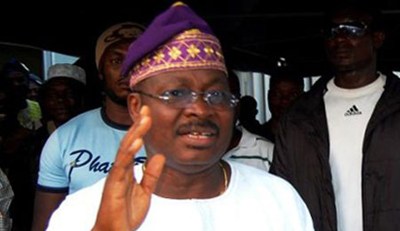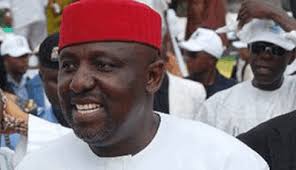Ajimobi, Akala tango at governorship debate
Ajimobi, Akala tango at governorship debate
*As Ladoja boycotts
A live debate organized by an Ibadan-based private radio station, Space FM, for candidates in the February 28 governorship election in Oyo State provided a veritable platform for the incumbent Governor, Senator Abiola Ajimobi and one of his predecessors, ex-Governor Adebayo Alao-Akala, to sell their manifestos to the people of the state.
The governorship candidate of the Accord Party, Senator Rashidi Ladoja, who was also billed to appear on the programme, however, boycotted the debate. The organizers did not tell listeners why the former governor failed to appear on the live broadcast.
Although the debate did not generate any rancour between the two contenders, they, however disagreed on some policy issues, while they agreed on others.
Governor Ajimobi used the opportunity to explain that traders were asked to vacate road setbacks and embankments to pave way for road expansion and erosion control based on advice by experts invited to find solution to the perennial flooding in Ibadan.
He said that the government was worried about the several lives and property that had been lost to flooding, hence the decision to ask the traders to vacate the roadsides for proper erosion control.
Ajimobi said, “But one thing that I must emphasise is that my two predecessors also displaced traders from Aperin and Iwo Road without providing alternatives for them. We did our own with human face by ensuring that 7000-capacity market was constructed to accommodate the displaced traders.
“Not only that, we gave traders in Oyo State about N500million interest-free loans to boost their trade. Thank God my brother is here (Alao-Akala). When his government displaced traders from Iwo road, it did not construct new markets to accommodate them.
“All what we did was in the best interest of our people. For instance, we observed that trading by the roadsides exposed them to danger. We have seen situations when electric pole fall on them and in another instance a trailer killed many of our people trading by the roadside.”
Responding to the issue of markets construction by the Ajimobi government, Alao-Akala said it was not the business of any government to construct markets, insisting that markets sprung up naturally everywhere.
He said he could not recollect whether he displaced traders from the roadside or not, insisting that “what belonged to the past should be left in the past.”
In his almost four years in the saddle, the governor said that peace and tranquility pervaded the entire state, which he said provided the enabling environment for industrial growth and overall development in the state.
For instance, the governor said the enabling peace and security in the state had attracted more than eight industrial giants to the state, which had generated more than one million direct and indirect employment for the citizens.
Ajimobi said that it was also during his administration that 5,300 teachers and 200 education officers were recruited at once across the state and posted to their place of origin to promote family cohesion.
During the period, he said he employed 20,000 youths, the number the governor said he would double to 40,000 if re-elected.
Alao-Akala, who refused answer questions relating to his achievements during his first tenure as governor, promised to devote attention to agriculture to boost the economy of the state by ensuring that graduates had access to agric loans; as panacea to the dwindling oil revenue.
He also promised to promote 6-3-3-4 system of education to encourage vocational and technical education.
The ex-governor said, “What we did in the past belonged to the past; whether good or bad. We don’t need to go back to history concerning what I did or did not do during my first tenure. The records are there.
“But, I must say that I received award from the Central Bank of Nigeria for being an agric-friendly governor. The N400m I was given was also spent or expanding the agric frontiers.”
Both governors agreed that it was not possible for any government to make tertiary education free, because of the challenges involved.




